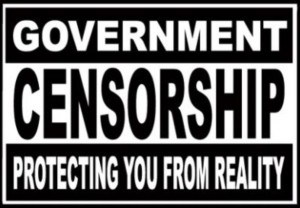– This is How the U.S. Government Convinces a Newspaper to Kill a Story (Liberty Blitzkrieg, Jan 20, 2015):
Under President George W. Bush, the White House urged reporters to withhold accounts about many of the most contentious aspects in the war on terrorism: the existence of a secret prison in Thailand, the Central Intelligence Agency’s interrogation and detention program, warrantless wiretapping and government monitoring of financial transactions.
The Obama administration has persuaded reporters to delay publishing the existence of a drone base in Saudi Arabia, the name of a country in which a drone strike against an American citizen was being considered, the fact that a diplomat arrested in Pakistan was a C.I.A. officer and that an American businessman was working for the agency when he disappeared in Iran.
– From the New York Times article: Condoleezza Rice Testifies on Urging The Times to Not Run Article
The timidness with which mainstream media in the U.S. approaches news has been well documented. In fact, the inability of traditional media to do a reasonable job of holding powerful interests accountable has been one of the primary drivers behind the ascendency of alternative news. Despite this reality, one thing we know less about is specifically how the power structure goes about suppressing news it doesn’t want reaching the plebs. Until now.
Ironically, the New York Times reported on its own prior inability to report the news:
WASHINGTON — White House officials favor two primary tactics when they want to kill a news article, Condoleezza Rice, the former national security adviser, testified Thursday: They can essentially confirm the report by arguing that it is too important to national security to be published, or they can say that the reporter has it wrong.
Sitting across from a reporter and editor from The New York Times in early 2003, Ms. Rice said, she tried both.
Yes indeed. When it comes to censoring the news, the U.S. government will do “whatever it takes.”
Testifying in the leak trial of Jeffrey Sterling, a former C.I.A. officer, Ms. Rice described how the White House successfully persuaded Times editors not to publish an article about a secret operation to disrupt Iran’s nuclear program. James Risen, a Times reporter, ultimately revealed the program in his 2006 book, “State of War,” and said that the C.I.A. had botched the operation. Prosecutors used Ms. Rice’s testimony to bolster their case that the leak to Mr. Risen had harmed national security.
Ms. Rice’s account also threw a light on how the government pressures journalists to avoid publishing details about United States security affairs. It is a common practice that is seldom discussed.
Under President George W. Bush, the White House urged reporters to withhold accounts about many of the most contentious aspects in the war on terrorism: the existence of a secret prison in Thailand, the Central Intelligence Agency’s interrogation and detention program, warrantless wiretapping and government monitoring of financial transactions.
The Obama administration has persuaded reporters to delay publishing the existence of a drone base in Saudi Arabia, the name of a country in which a drone strike against an American citizen was being considered, the fact that a diplomat arrested in Pakistan was a C.I.A. officer and that an American businessman was working for the agency when he disappeared in Iran.
Makes you wonder, who isn’t working for the C.I.A. at this point?
According to notes of the White House meeting, George J. Tenet, the C.I.A. director at the time, told Mr. Risen and his editor, Jill Abramson, that the program was not mismanaged and that Iran had not discovered the design flaw. The C.I.A. prepared talking points for Ms. Rice that said that revealing the program would not only jeopardize the former Russian scientist — who had become an American citizen — but “conceivably contribute to the deaths of millions of innocent victims” in the event of an Iranian nuclear attack. Ms. Rice said she urged The Times to destroy any documents or notes about the program.
This is quite the shocker. Who would ever suspect a key proponent of the Iraq War to dabble in such outlandish hyperbole.
The Times ultimately did not run the article. Ms. Abramson, who was the Washington bureau chief at the time, said recently that she regretted not pushing to publish it. Told about Ms. Rice’s testimony, Ms. Abramson said in an email on Thursday that the trial “seems anticlimactic and pointless.”
The only question is, what are they “choosing not to publish” in 2015?
For related posts, see:
Editor in Asia Leaves Bloomberg News Citing Censorship
Google Transparency Report: Worldwide Government Censorship Requests Up 26%
Meet Amber Lyon: Former Reporter Exposes Massive Censorship at CNN
In Liberty,
Michael Krieger
